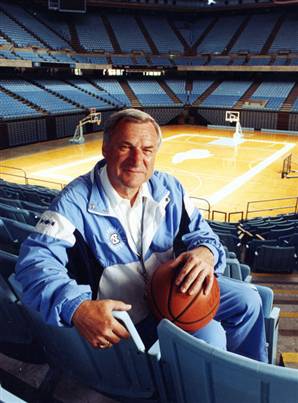On Dean Smith And Memories
Posted by jstevrtc on July 19th, 2010Over the past couple of weeks we’ve all heard about the memory loss to which former North Carolina coach Dean Smith has fallen victim. The subject was recently visited in an article that appeared in the Fayetteville Observer earlier this month, and John Feinstein soon followed up with a statement on his site regarding the matter, since he had worked with Smith on what now sounds like a abandoned project that was to be a book about the coach. The tragic irony — that Dean Smith, the very creator of so many college basketball memories for so many people, is now having trouble remembering parts of them — has been lost on nobody.
Then, over the weekend, Smith’s family sent a letter to his former players via current chief Roy Williams, a letter that served as an update on Smith’s condition, a note of appreciation, and a request for privacy. There are positives and negatives in the picture that’s painted, and the actual problem that Smith is having isn’t specifically named — on which more in a moment.

The living legend may have some memory problems, but the collective conscience of college basketball does not.
Smith is the second legendary coach we’ve seen in recent times who’s had to deal with a problem of this nature. Lute Olson, a man who’s face, voice, coaching style, and overall debonair still stand as symbols of Arizona Wildcat basketball, also dealt with issues of a neurological nature. Back in 2008, Olson underwent profound personality changes in a relatively short period of time, sometimes showing behaviors so inconsistent with his usual self that a subsequent MRI revealed a “previously undiagnosed” stroke as the causative factor.
Do not, however, make the mistake in assuming that Coach Smith’s situation is the same as Coach Olson’s, or that they will follow the same course. The scenarios are quite different. Olson’s behavioral change had a specific cause, but there doesn’t seem to be a specific reason cited to account for Smith’s spotty but evidently progressive memory loss. In Feinstein’s article, he mentions that both he and Coach Smith himself had noticed some changes in Smith in 2005, but that there was also a knee-replacement surgery in 2007 that had complications in the form of “neurological issues.” The words “Alzheimer’s Disease” have popped up in a couple of places (we are intentionally not linking them here), and while that would fit under the umbrella of what Smith’s family refers to as a “progressive neurocognitive disorder which affects his memory,” there are several other things that fit there, as well. We haven’t spoken directly to the family, haven’t examined Smith, and have no other data to use, so it might be a little early to make that diagnosis. There are at least 20 other disorders that could fall under that heading.
The fact that the family letter uses vague-yet-specific terms like the one above leads us to conclude at least one of two things: either the family isn’t quite sure of a diagnosis, or they just don’t want people talking about it, and we’re betting that the latter is certainly true. The rather touching bulletin sent from the family to Smith’s former players asks for privacy, and Smith’s wife Linnea has intentionally stayed away from labeling the disorder, so we’ll obey their request by refraining from any further speculation here. Instead, because most of the talk about this has focused on the obviously disappointing matter of Smith’s progressive memory loss, let’s make sure we hit the positive, too. The guy’s still getting fired up watching Tar Heel games on TV, he’s still making the occasional public appearance, he’s still attending his grandson’s Little League games — we wonder how tough it is for him to keep from lending advice to the coaches — and he’s still getting in at least nine holes of golf when he can. All things considered, we don’t think that’s too shabby for age 79. [Author’s Note: if I actually get to 79, I hope I’m doing as well.]
No matter the actual cause, a disorder that causes progressive memory loss doesn’t just affect the person who has it. It also has an affect on the immediate friends and family; it’s awful to have to watch a loved one go through it, and the family (quite often just a single person in the form of a spouse) sometimes has to take on a dramatically increased role in the daily care of the person affected. Wherever they are on the spectrum, the people with these disorders do better when they have good support networks, and there is no question that Smith has been blessed with that. In fact, if you’re the Smith family, you could hardly ask for a better support network than what’s often referred to as the Carolina Family, meaning the network of extended family, friends, players, coaches, program supporters, broadcasters, writers, bloggers, and fans — the concentric circles certainly extend farther still — who love the living legend at the center. All the folks here at RTC certainly extend our thoughts and prayers toward Coach Smith. So hit ’em straight, coach, when you’re out there on the course. Whether you’re watching those games at home or in the arena that bears your name, though it might contradict your humble nature, we hope you’ll continue to take some enjoyment as you survey the empire you’ve created. And as far as all those memories you gave to the game, if you drop a few, don’t worry. Anyone who loves college basketball is keeping them for you, and we promise to take good care of them.









































